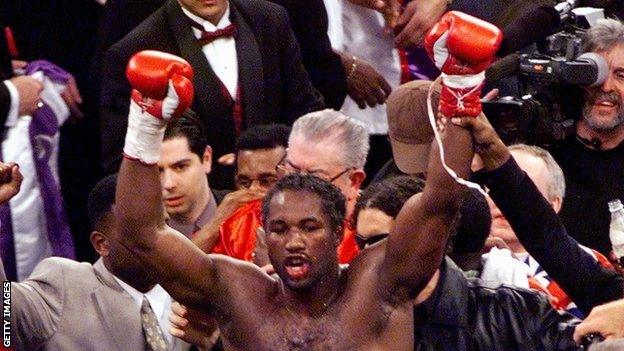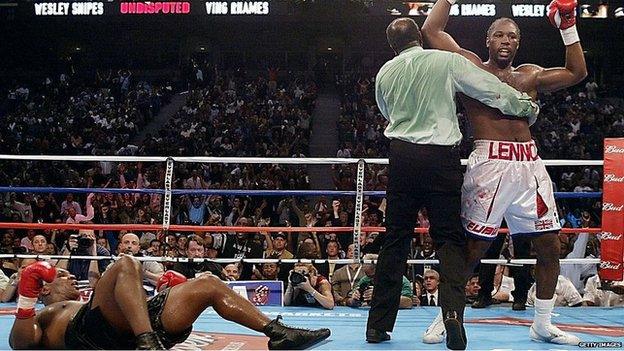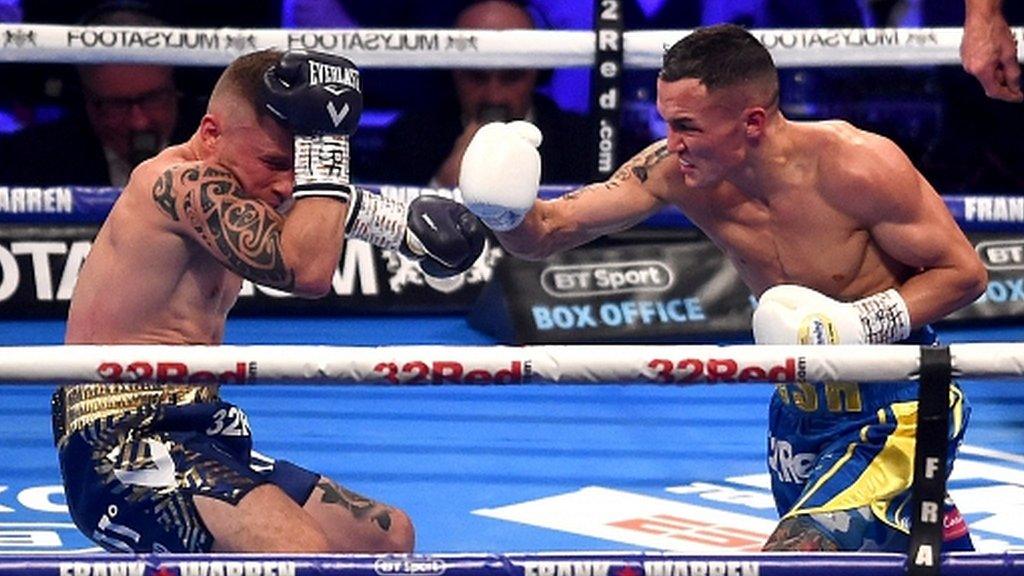Lennox Lewis v Evander Holyfield 20 years on: 'An outrage, a highway robbery'
- Published

Lennox Lewis' celebrations were cut short when his fight against Evander Holyfield was scored a draw
On 13 March 1999, Britain's Lennox Lewis fought American Evander Holyfield at New York's Madison Square Garden. The winner would be crowned the 'undisputed' heavyweight champion of the world. The fight finished - controversially - in a draw. Twenty years on, Mike Costello shares his memories.
Back then, only the social media storm was missing.
The visiting Briton had been denied his moment of glory, the American was lucky to grab his share of the broils. When Tyson Fury's fight against Deontay Wilder in Los Angeles in December was scored a draw, the narrative could have been lifted from Madison Square Garden in March 1999. Some said Fury had been "Lennox-ed".
Words such as "scandal" and "atrocity" were among those used to report the plight of Lennox Lewis after he appeared to dominate his unification contest against Evander Holyfield, only for the fight to end in a draw., external
Lewis' manager Kellie (then Frank) Maloney called on Prime Minister Tony Blair to break off diplomatic relations with the United States. The Mayor of New York, Rudy Giuliani, said he was embarrassed on behalf of his city. "That is, ladies and gentlemen, a travesty," went the commentary of HBO's Jim Lampley, "an outrage, a highway robbery."
You get the gist.
The stench around Holyfield-Lewis - even at a time pre-Twitter, Facebook and other social media platforms - was far more intense than the controversy generated by Wilder-Fury. Two decades ago, American fervour for the heavyweight division was greater, in keeping with the extent of media coverage. About 1.2 million homes bought the pay-per-view coverage in the US, almost four times the figure for Wilder-Fury.
It was a time not just of Holyfield and Lewis but of Riddick Bowe and the ex-convict Mike Tyson. Holyfield and Bowe had engaged in a trilogy bettered for quality only by Muhammad Ali-Joe Frazier in the history of boxing's glamour division. And Tyson's nibbling of Holyfield's ears in 1997 prompted a recalibration of the sport's Richter scale.
Lewis had won, lost and regained the world title. He had earned $4m (£3m) in what is known as "step-aside money" when giving up the chance to face Tyson in 1996 and allowing hapless American Bruce Seldon to climb through the ropes instead, detaining Tyson for all of 109 seconds.
Maloney, in her autobiography No Baloney, referred to the payment as "damages", and such arrangements among promoters and managers are renowned. Whatever the choice of words, Lewis was kept waiting for a defining night against a big-name American.

Lewis finally fought Tyson in June 2002, with the Briton winning via an eighth-round knockout
Memories of the greatest night in the Garden's history were stirred by the appointment of Arthur Mercante Jr as referee. His father, Arthur Sr, was the third man in the 'Fight of the Century' featuring Ali and Frazier in 1971. Also following the path laid by his dad was Jimmy Lennon Jr as MC.
At stake were the WBC title held by Lewis and the WBA and IBF belts owned by Holyfield. The announcing of the fight as being for the "undisputed" heavyweight championship of the world conveniently omitted the fact Britain's Herbie Hide held the WBO version at the time.
Holyfield was installed as a narrow favourite, with many believing his calculated pressure would be decisive.
On the night 'The Real Deal' found it hard to bypass Lewis' potent left jab in the early stages, before becoming more effective in the second half of the fight.
Of the judges, Stanley Christodolou of South Africa made Lewis the winner by three rounds and Britain's Larry O'Connell scored it a draw (just as, three months ago, the lone British judge Phil Edwards could not split Wilder and Fury).
The scorecard handed in by American Jean Williams created the bulk of the controversy. In giving Holyfield the nod by 115-113 (seven rounds to five), she somehow awarded the American the fifth round. It was the best round of the fight for Lewis and, for many, reflected his overall command of the contest.
Williams and promoter Don King were forced to deny being involved in a fix, and such was the level of opprobrium were called to appear before a New York State Senate Committee a few days later.
Williams admitted to making a mistake in scoring the fifth round for Holyfield, claiming her view was obstructed by ringside photographers. Her revised scorecard would have been a draw, and therefore the overall result would not have changed. She later won a libel case against Mirror Group Newspapers in the UK in relation to a report inferring she had accepted money to influence her scoring.
For me, Lewis won by seven rounds to five and generally seemed to be in control, but I remember being surprised at the magnitude of the tempest. Lewis failed to win any of rounds eight, nine, 10 and 11 - an indication he let slip his grip. Just one of those rounds in his favour would have made the difference.
Boos greeted the announcement of the decision, underscoring the demographic of the 21,000-crowd which created an impression of Lewis being the home fighter.
Maloney had entered the ring dressed in a Union Jack suit. Fight day had started with reports of him being sacked as Lewis' manager, in an apparent in-camp feud with promoter Panos Eliades. Denials and retractions were issued before fight time.
On the undercard, I watched in a near-empty arena as Howard Clarke from Warley in the west Midlands was outclassed by Fernando Vargas - a team-mate of Floyd Mayweather's on the American team at the 1996 Olympics in Atlanta - in a crack at the world super-welterweight title. Clarke was in too deep, against a man who would later lose only to Oscar de la Hoya, Shane Mosley, Ricardo Mayorga and Felix Trinidad.
The Garden housed a media centre during fight week and there was a genuine sense of being in a hallowed boxing venue. Anthony Joshua makes his American debut there against Jarrell Miller in June and he would settle for the rousing ovation received by Lewis during the short walk from the dressing-room to the ring.
Holyfield and Lewis met in a rematch in Las Vegas in November 1999, external, with Lewis adjudged the winner on all three scorecards. Yet some writers, British as well as American, felt Holyfield had done enough to get his hand raised at the finish. When a draw would have been a fair result, Lewis got the nod... a reversal of eight months earlier.
- Published22 December 2018
